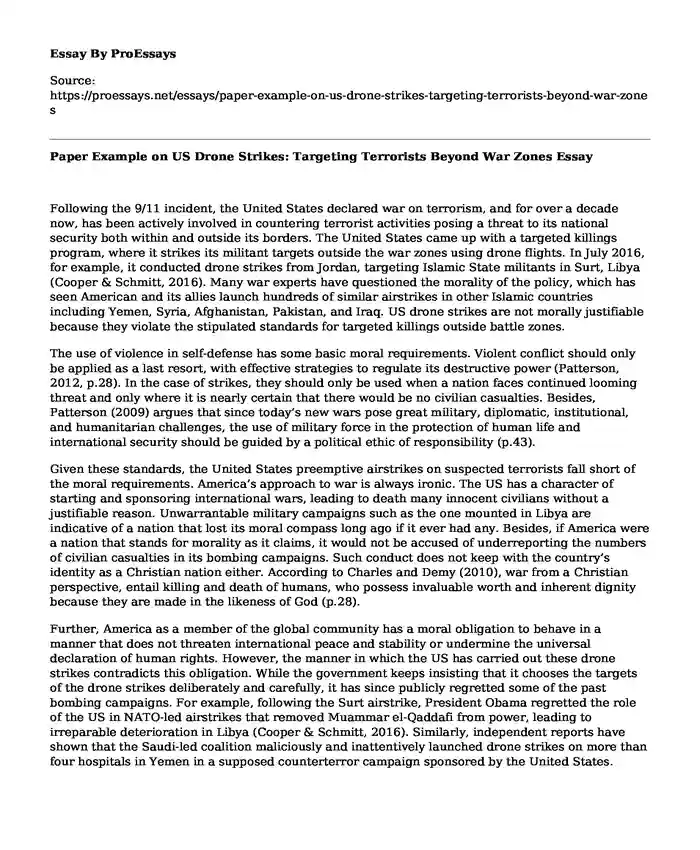Following the 9/11 incident, the United States declared war on terrorism, and for over a decade now, has been actively involved in countering terrorist activities posing a threat to its national security both within and outside its borders. The United States came up with a targeted killings program, where it strikes its militant targets outside the war zones using drone flights. In July 2016, for example, it conducted drone strikes from Jordan, targeting Islamic State militants in Surt, Libya (Cooper & Schmitt, 2016). Many war experts have questioned the morality of the policy, which has seen American and its allies launch hundreds of similar airstrikes in other Islamic countries including Yemen, Syria, Afghanistan, Pakistan, and Iraq. US drone strikes are not morally justifiable because they violate the stipulated standards for targeted killings outside battle zones.
The use of violence in self-defense has some basic moral requirements. Violent conflict should only be applied as a last resort, with effective strategies to regulate its destructive power (Patterson, 2012, p.28). In the case of strikes, they should only be used when a nation faces continued looming threat and only where it is nearly certain that there would be no civilian casualties. Besides, Patterson (2009) argues that since today’s new wars pose great military, diplomatic, institutional, and humanitarian challenges, the use of military force in the protection of human life and international security should be guided by a political ethic of responsibility (p.43).
Given these standards, the United States preemptive airstrikes on suspected terrorists fall short of the moral requirements. America’s approach to war is always ironic. The US has a character of starting and sponsoring international wars, leading to death many innocent civilians without a justifiable reason. Unwarrantable military campaigns such as the one mounted in Libya are indicative of a nation that lost its moral compass long ago if it ever had any. Besides, if America were a nation that stands for morality as it claims, it would not be accused of underreporting the numbers of civilian casualties in its bombing campaigns. Such conduct does not keep with the country’s identity as a Christian nation either. According to Charles and Demy (2010), war from a Christian perspective, entail killing and death of humans, who possess invaluable worth and inherent dignity because they are made in the likeness of God (p.28).
Further, America as a member of the global community has a moral obligation to behave in a manner that does not threaten international peace and stability or undermine the universal declaration of human rights. However, the manner in which the US has carried out these drone strikes contradicts this obligation. While the government keeps insisting that it chooses the targets of the drone strikes deliberately and carefully, it has since publicly regretted some of the past bombing campaigns. For example, following the Surt airstrike, President Obama regretted the role of the US in NATO-led airstrikes that removed Muammar el-Qaddafi from power, leading to irreparable deterioration in Libya (Cooper & Schmitt, 2016). Similarly, independent reports have shown that the Saudi-led coalition maliciously and inattentively launched drone strikes on more than four hospitals in Yemen in a supposed counterterror campaign sponsored by the United States.
Conclusion
In conclusion, there is no denying that there can be situations where targeted killings would be the only way to avert planned terrorist activities. Suicide bombers, for example, cannot be taken alive because they plan to die in the attack. It is also true that the moral standards for targeted killings allow civilian casualties proportionate to the magnitude of the security threat. However, the US targeted killings program is deliberately surrounded by intense secrecy to prevent the public from truly assessing its morality. The lack of openness on the part of the government can only mean that it is knowingly abdicating its moral duties to uphold justice in its war on terror.
References
Charles, J. D., & Demy, T. J. (2010). War, peace, and Christianity: Questions and answers from a just-war perspective. Crossway.
Cooper, H., & Schmitt, E. (2016, August 3). U.S. strikes help Libyan forces against ISIS in Surt. The New York Times - Breaking News, World News & Multimedia. https://www.nytimes.com/2016/08/03/us/politics/drone-airstrikes-libya-isis.html?_r=0&auth=linked-google
Patterson, E. (2009). Just war thinking: Morality and pragmatism in the struggle against contemporary threats. Lexington Books.
Patterson, E. D. (2012). Ending wars well: Order, justice, and conciliation in contemporary post-conflict. Yale University Press.
Cite this page
Paper Example on US Drone Strikes: Targeting Terrorists Beyond War Zones. (2023, Oct 03). Retrieved from https://proessays.net/essays/paper-example-on-us-drone-strikes-targeting-terrorists-beyond-war-zones
If you are the original author of this essay and no longer wish to have it published on the ProEssays website, please click below to request its removal:
- Bacon and Plato on Knowledge
- Key Things About the Culture From Scholarly Sources: Culture of Homeless People
- Why Texas Should Not Lower the Drinking Age Essay
- Paper Example on Sleezy & Sly Co.: Unethical Use of Illegally Acquired Tax Package
- Racial Profiling: Its Use in War Against Terrorism - Essay Sample
- Essay Example on Reconstruction of Destroyed Infrastructure: Challenges & Considerations
- Free Paper on Harlem Renaissance: African-American Cultural Revival Amidst Oppression







